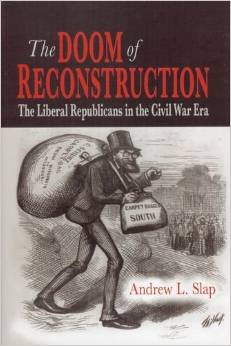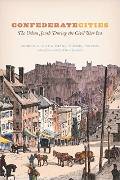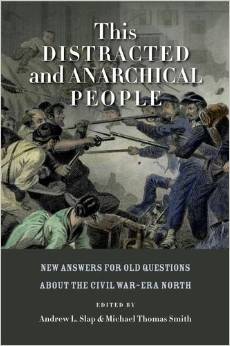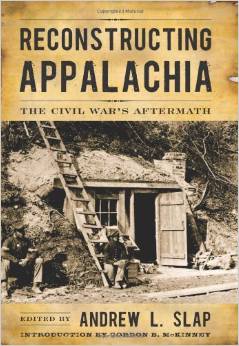Education:
B.A., 1994, University of Massachusetts at Amherst
Ph.D., 2002, Pennsylvania State University
About Dr. Slap:
Andrew Slap's research and teaching focuses on nineteenth-century American history, particularly a broadly conceived Civil War era. He has published books on Reconstruction politics, Appalachia after the Civil War, and the urban South during the Civil War era. He is currently working on a book project about African American communities in nineteenth-century Memphis. The work uses a generational cohort that came of age during emancipation to study the nature of African American communities in the 19th century. The communities that emerge challenge central paradigms of African American history, showing that emancipation was a gradual process in which multiple antebellum African American communities and traditions continued through the end of the 19th century. Some of his early publications from this project include essays on African American marriage practices in the era of emancipation and the process of African American urbanization in the decades after the Civil War. In addition to teaching a wide variety of courses -- including ones on the Civil War, comparative slavery, and Appalachia -- he regularly works with graduate students.
Dr. Slap is also the series editor for two separate book series: Reconstructing America, Fordham University Press and The North's Civil War, Fordham University Press
Areas of Academic Specialty
19th-Century America
Selected Publications:
Books:
The Doom of Reconstruction: The Liberal Republicans n the Civil War Era (Reconstructing America)
In the Election of 1872 the conflict between President U. S. Grant and Horace Greeley has been typically understood as a battle for the soul of the ruling Republican Party. In this innovative study, Andrew Slap argues forcefully that the campaign was more than a narrow struggle between Party elites and a class-based radical reform movement.
The election, he demonstrates, had broad consequences: in their opposition to widespread Federal corruption, Greeley Republicans unintentionally doomed Reconstruction of any kind, even as they lost the election. Based on close readings of newspapers, party documents, and other primary sources, Slap confronts one of the major questions in American political history: How, and why, did Reconstruction come to an end? His focus on the unintended consequences of Liberal Republican politics is a provocative contribution to this important debate.
Confederate Cities: The Urban South during the Civil War Era (Historical Studies of Urban America)
When we talk about the Civil War, we often describe it in terms of battles that took place in small towns or in the countryside: Antietam, Gettysburg, Bull Run, and, most tellingly, the Battle of the Wilderness. One reason this picture has persisted is that few urban historians have studied the war, even though cities hosted, enabled, and shaped Southern society as much as they did in the North.
Confederate Cities, edited by Andrew L. Slap and Frank Towers, shifts the focus from the agrarian economy that undergirded the South to the cities that served as its political and administrative hubs. The contributors use the lens of the city to examine now-familiar Civil War–era themes, including the scope of the war, secession, gender, emancipation, and war's destruction. This more integrative approach dramatically revises our understanding of slavery's relationship to capitalist economics and cultural modernity. By enabling a more holistic reading of the South, the book speaks to contemporary Civil War scholars and students alike—not least in providing fresh perspectives on a well-studied war.
This Distracted and Anarchical People: New Answers for Old Questions about the Civil War-Era North
While most of the fighting took place in the South, the Civil War profoundly affected the North. As farm boys became soldiers and marched off to battle, social, economic, and political changes transformed northern society. In the generations following the conflict, historians tried to understand and explain the North's Civil War experience. Many historical explanations became taken for granted, such as that the Union Army was ideologically Republican, northern Democrats were disloyal, and German Americans were lousy soldiers. Now in this eye-opening collection of eleven stimulating essays, new and important information is unearthed that solidly challenges the old historical arguments.
The essays in This Distracted and Anarchical People range widely throughout the history of the Civil War North, using new methods and sources to reexamine old theories and discover new aspects of the nation's greatest conflict. Many of these issues are just as important today as they were a century and a half ago. What were the extent and limits of wartime dissent in the North? How could a president most effectively present himself to the public? Can the savagery of war ever be tamed? How did African Americans create and maintain their families?
This Distracted and Anarchical People highlights the newest scholarship on a diverse array of topics, bringing fresh insight to bear on some of the most important topics in history today--such as the democratic press in the antebellum North, peace movements, the Union Army and the elections of 1864, Liberia and the U.S. Civil War, and African American veterans and marriage practices after Emancipation.
Reconstructing Appalachia: The Civil War's Aftermath (New Directions in Southern History)
Families, communities, and the nation itself were irretrievably altered by the Civil
War and the subsequent societal transformations of the nineteenth century. The repercussions
of the war incited a broad range of unique problems in Appalachia, including political
dynamics, racial prejudices, and the regional economy.
Andrew L. Slap's anthology Reconstructing Appalachia reveals life in Appalachia after
the ravages of the Civil War, an unexplored area that has left a void in historical
literature. Addressing a gap in the chronicles of our nation, this vital collection
explores little-known aspects of history with a particular focus on the Reconstruction
and post-Reconstruction periods. Acclaimed scholars John C. Inscoe, Gordon B. McKinney,
and Ken Fones-Wolf are joined by up-and-comers like Mary Ella Engel, Anne E. Marshall,
and Kyle Osborn in a unique volume of essays investigating postwar Appalachia with
clarity and precision.
Featuring a broad geographic focus, these compelling essays cover postwar events in Georgia, Kentucky, North Carolina, Tennessee, West Virginia, and Pennsylvania. This approach provides an intimate portrait of Appalachia as a diverse collection of communities where the values of place and family are of crucial importance. Highlighting a wide array of topics including racial reconciliation, tension between former Unionists and Confederates, the evolution of post--Civil War memory, and altered perceptions of race, gender, and economic status, Reconstructing Appalachia is a timely and essential study of a region rich in heritage and tradition.
Articles and Essays:
"'No regular marriage': African American Veterans and Marriage Practices during Reconstruction," in This Distracted and Anarchical People: New Answers for Old Questions about the Civil War Era North. Editors Andrew L. Slap and Michael T. Smith. New York: Fordham University Press, 2012
"The Loyal Deserters: African American Deserters and Community in Civil War Memphis," in Weirding the War: Stories from the Civil War War's Ragged Edges. Editor Stephen Berry. Athens, Georgia: University of Georgia Press (Fall 2011).
"A New Frontier: Historians, Appalachian History, and the Aftermath of the Civil War," in Reconstructing Appalachia: The Civil War's Aftermath. Editor Andrew L. Slap. Lexington, Kentucky: University Press of Kentucky (Spring 2010).
"'The Strong Arm of the Military Power of the United States': The Chicago Fire, the Constitution, and Reconstruction," Civil War History, 47 (June 2001): 146-63.
"The Spirit of '76: The Reconstruction of History in the Redemption of South Carolina," The Historian ,63 (Summer 2001): 769-86.
 Sam Wilson West Parking Lot C...
Sam Wilson West Parking Lot C... 



